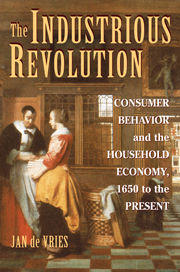Book contents
- Frontmatter
- Contents
- List of Figures
- Preface and Acknowledgments
- 1 The Transformation of Consumer Desire in the Long Eighteenth Century
- 2 The Origins of the Industrious Revolution
- 3 The Industrious Revolution: The Supply of Labor
- 4 The Industrious Revolution: Consumer Demand
- 5 The Breadwinner–Homemaker Household
- 6 A Second Industrious Revolution?
- Bibliography
- Index
2 - The Origins of the Industrious Revolution
Published online by Cambridge University Press: 05 June 2012
- Frontmatter
- Contents
- List of Figures
- Preface and Acknowledgments
- 1 The Transformation of Consumer Desire in the Long Eighteenth Century
- 2 The Origins of the Industrious Revolution
- 3 The Industrious Revolution: The Supply of Labor
- 4 The Industrious Revolution: Consumer Demand
- 5 The Breadwinner–Homemaker Household
- 6 A Second Industrious Revolution?
- Bibliography
- Index
Summary
I move now from a theoretical account of how consumer demand can change to a brief and schematic historical account of how an industrious revolution could emerge from a society in which most manifestations of consumer demand had long been socially restricted and morally suspect.
From Prodigality and Profusion to a Consumer Society
The leisure-rich society. The ideal of most Western societies from Greek republican ideology to the aristocratic cultures of the early modern era was to have abundant leisure. Leisure is itself a tricky concept with at least three distinct dimensions: (1) “consumption time” – the time needed to actually use the goods and services we have acquired; (2) “cultural time” – the time devoted to the cultivation of mind and spirit, and to governance and charity; (3) “free time” – passive idleness, which, to the extent that it achieves the physical recuperation necessary for active labor, is not properly leisure at all. Modern leisure is very much focused on the first dimension, “consumption time,” but this was not the case in the leisure-rich societies of the past. In the terms of the household consumption model (introduced in Chapter 1), the desired Z-commodities of a leisure-rich society were achieved with relatively few goods (x) and much time, the time being chiefly “cultural time.” The ideal was to be freed from manual work, a prerequisite for the autonomy of action that allowed one to pursue the cultivation of virtue.
- Type
- Chapter
- Information
- The Industrious RevolutionConsumer Behavior and the Household Economy, 1650 to the Present, pp. 40 - 72Publisher: Cambridge University PressPrint publication year: 2008



